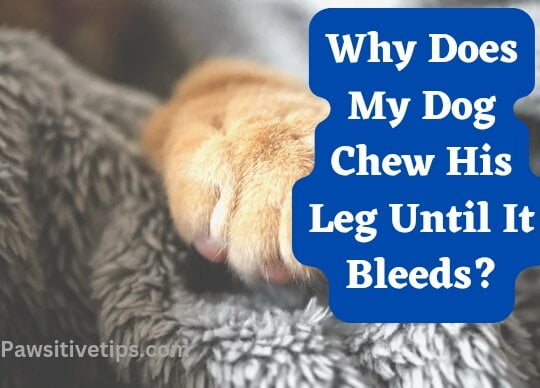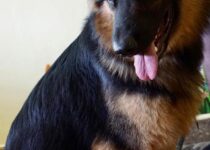Why Does My Dog Chew His Leg Until It Bleeds? (2024)
Why do dogs chew their paws to the point of bleeding? My simple answer is: madness! I mean, outright insanity!!!🤣 Relax, don’t mind my wacky joke. But with all seriousness, I just received a message on our TikTok page, and the user asked this question, “Why Does My Dog Chew His Leg Until It Bleeds?” I was like, “What in the world would make a dog do a thing like this if not a mental problem?
Anyway, if you’ve ever noticed your beloved furry friend incessantly chewing on their leg to the point of bleeding, you may find yourself understandably concerned and wondering why this behavior occurs. In this article, I will delve into the various reasons why dogs chew their legs excessively, the potential underlying causes, and effective solutions to help alleviate this distressing issue.
Why does my dog chew his leg until it bleeds?
Dogs may chew their legs until they bleed due to various reasons, including medical conditions such as:
Medical conditions and allergies
One of the primary reasons why dogs chew their paws until they bleed is due to various medical conditions or allergies. Some of these include:
- Skin Allergies: Dogs can develop allergies to certain foods, environmental triggers, or fleas, leading to intense itching and self-inflicted wounds.
- Dermatitis: Contact dermatitis, atopic dermatitis, or other forms of skin inflammation can cause severe itching, prompting dogs to chew their legs in an attempt to find relief.
- Parasites: Fleas, ticks, mites, or other external parasites can cause intense itching and discomfort, leading to excessive chewing of their legs.
- Infections: Bacterial or fungal infections can cause irritation and itching, prompting dogs to chew at affected areas.
Psychological factors and behavioral issues
Beyond medical conditions, psychological factors and behavioral issues can also contribute to excessive leg chewing:
- Anxiety and Stress: Dogs experiencing anxiety or stress may resort to excessive chewing of their paws or bedsheets as a coping mechanism. Separation anxiety, fear, or changes in the environment can also trigger this behavior.
- Boredom: Dogs left alone for extended periods or lacking mental stimulation may chew their legs until they bleed out of sheer boredom.
- Compulsive Behaviors: Some dogs develop compulsive behaviors, such as obsessive leg chewing, as a result of underlying psychological issues. This behavior may be triggered by genetics, early life experiences, or trauma.
How do I get my dog to stop chewing on her leg?
Treating a dog’s excessive leg chewing involves identifying the underlying cause and implementing appropriate interventions. Here are several methods to consider when addressing and treating this issue:
Consult with a veterinarian
The first step in treating a dog’s excessive leg chewing is to consult with a veterinarian. They can examine your dog, identify any underlying medical conditions, and recommend appropriate treatment. This may include addressing allergies, infections, or parasites that could be causing the itching and discomfort leading to leg chewing.
Provide relief for itching and irritation
If the leg chewing is due to itching or irritation, there are several ways to provide relief:
- Topical Treatments: Your veterinarian may recommend or prescribe topical treatments such as medicated sprays, creams, or ointments to soothe the affected area and reduce itching.
- Oral Medications: In some cases, your veterinarian may prescribe oral medications such as antihistamines or steroids to alleviate itching and inflammation.
- Allergy Management: If allergies are the root cause, your veterinarian may suggest allergy testing or an elimination diet to identify and manage specific allergens.
Behavior modification techniques
For leg chewing caused by behavioral factors, behavior modification techniques can be effective. Here is how it works:
- Environmental Enrichment: Provide your dog with mental and physical stimulation to reduce boredom and distract from leg chewing. This can include interactive toys, puzzle feeders, and regular exercise.
- Training and Distraction: Teach your dog alternative behaviors and redirect their attention away from leg chewing. When you catch them chewing, offer a suitable chew toy and reward them when they engage with it instead.
- Desensitization and counter-conditioning: If anxiety or stress triggers leg chewing, work with a professional dog trainer or behaviorist to develop a desensitization and counter-conditioning plan. This involves gradually exposing your dog to triggers in a controlled and positive manner while rewarding calm and relaxed behavior.
Medications for anxiety or compulsive behaviors
In some cases, medication may be necessary to manage anxiety or compulsive behaviors that lead to leg chewing. Your veterinarian can evaluate your dog’s behavior and determine if medications, such as selective serotonin reuptake inhibitors (SSRIs), are appropriate. These medications can help reduce anxiety and compulsive behaviors when used in conjunction with behavior modification techniques.
Prevent further self-injury
While addressing the underlying cause, it is important to prevent your dog from causing further self-injury through leg chewing. Consider using an Elizabethan collar (cone) or a medical wrap to prevent access to the affected area. Ensure the collar or wrap is used under supervision and removed when your dog is not at risk of chewing.
Regular monitoring and follow-up
Monitor your dog’s progress closely and keep in touch with your veterinarian. Regular follow-up visits will help evaluate the effectiveness of the treatment plan and make any necessary adjustments.
Read also>>
Frequently Asked Questions
Why do dogs chew their paws until they bleed?
Dogs may chew their paws until they bleed for a range of reasons. Common causes include allergies, skin infections, parasites, foreign objects embedded in the paw, compulsive behavior, and anxiety.
How can I tell if my dog’s paw chewing is causing bleeding?
If you notice blood on your dog’s paws, paw pads, or in the areas where they’ve been chewing, it is a clear indication of bleeding. Additionally, you may observe signs of discomfort, redness, swelling, or raw skin in those areas.
Can allergies lead to paw chewing that causes bleeding?
Yes, allergies can cause intense itching and irritation, leading dogs to chew their paws excessively. Continuous chewing and scratching can break the skin, resulting in bleeding. Allergies to food, environmental factors (pollen, dust mites), or contact allergens can contribute to this behavior.
Are there any underlying medical conditions that could cause the paw to chew until it bleeds?
Yes, various medical conditions can cause dogs to chew their paws until they bleed. These can include bacterial or fungal infections, parasitic infestations (such as fleas or mites), autoimmune diseases, or injuries that result in open wounds or ulcers.
Can anxiety or stress lead to dogs chewing their paws until they bleed?
Yes, anxiety and stress can manifest in dogs as excessive chewing, including on their paws. Dogs may chew their paws as a self-soothing behavior when they are feeling anxious or stressed. This can lead to excessive chewing, causing irritation and potentially resulting in bleeding.
How can I prevent my dog from chewing their paws until they bleed?
Prevention involves addressing the underlying cause of the paw chewing. Start by consulting with a veterinarian to identify any medical issues or allergies. Follow their recommended treatment plan, which may include medication, dietary changes, or parasite prevention. Additionally, addressing any underlying anxiety or stress through behavior modification techniques and providing mental and physical stimulation can also help prevent excessive chewing.
Should I bandage my dog’s paws if they are bleeding from excessive chewing?
It is best to consult with a veterinarian before attempting to bandage your dog’s paws. In some cases, bandaging can provide protection and prevent further damage. However, improper bandaging techniques can impede healing or cause discomfort. A veterinarian should be able to guide you on proper wound care and whether bandaging is necessary for your dog’s specific situation.
Final Note
That’s it on the question: Why does my dog chew his leg until it bleeds? Remember, getting your dog to stop chewing on her leg requires patience, consistency, and addressing any underlying issues. By implementing these strategies and seeking professional guidance if needed, you can help your dog break the habit and promote a healthier and happier lifestyle.



